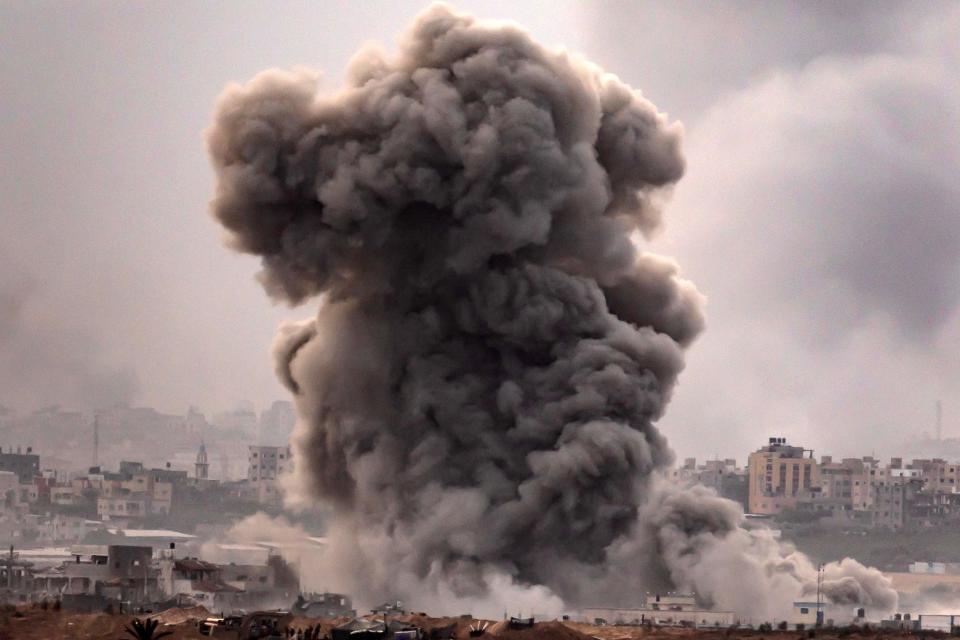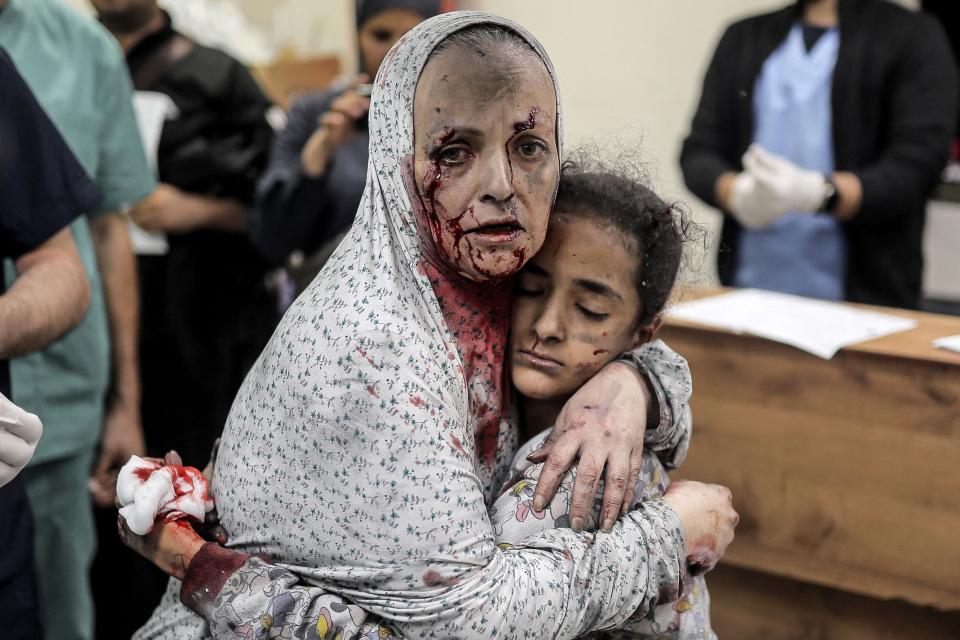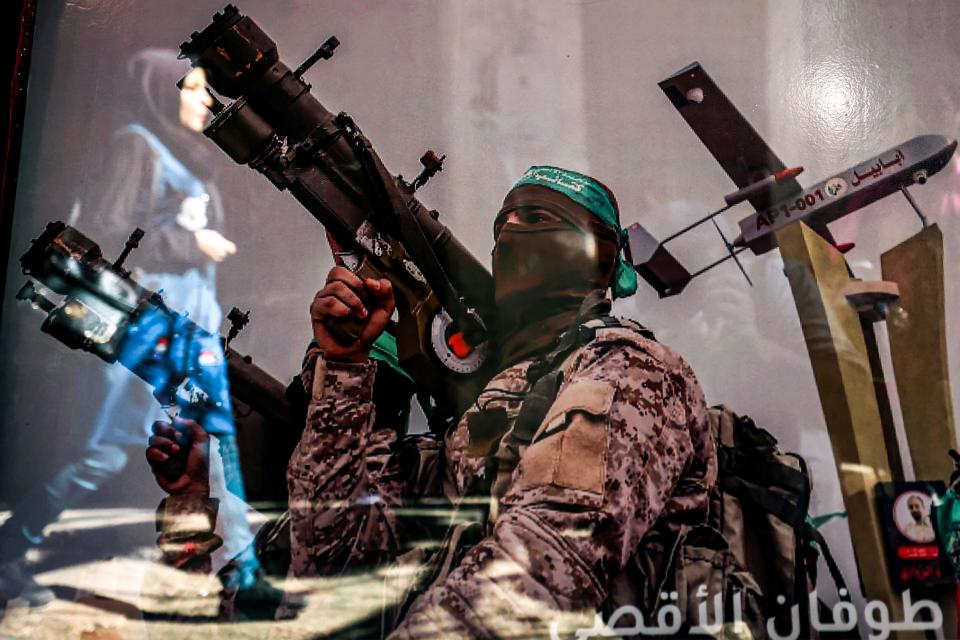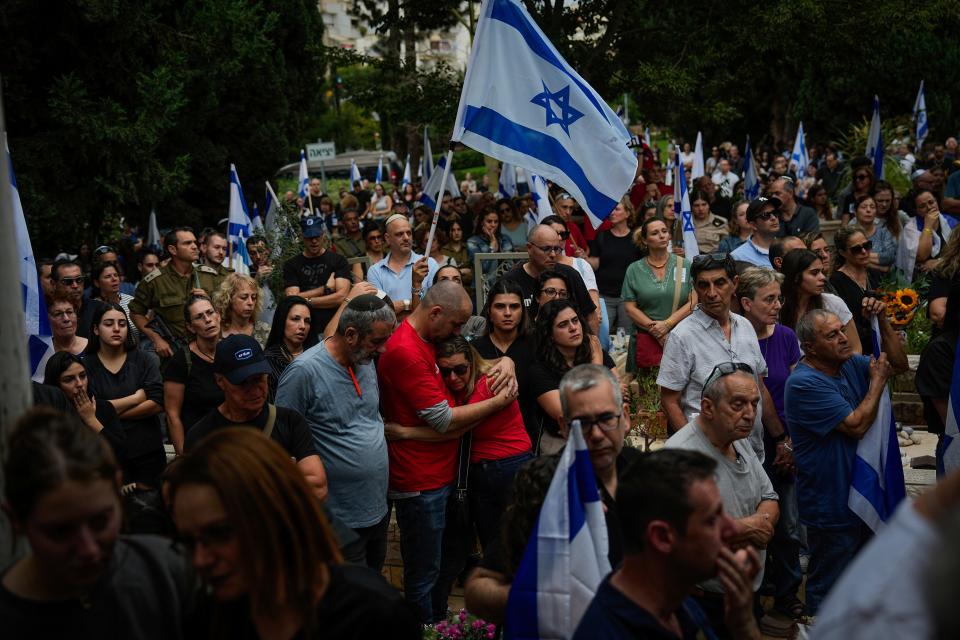'Self-silencing': For Palestinians, talking about Hamas comes with hazards
Long before Hamas's murderous rampage in Israel on Oct. 7, the group made a name for itself with its ruthless takeover of Gaza in 2007.
Its calling card? Killing its political rivals execution style in the streets, in hospital shootouts, and by throwing them off the rooftops of high-rise buildings. Since then, arbitrary detention, torture and enforced disappearances has been a hallmark of the regime.
Yet now, some Palestinians are "self-silencing" how they really view Hamas − and what they reveal about living under the U.S. and European Union-designated terror group in the Gaza Strip.
And according to more than a dozen Palestinians inside and outside Gaza interviewed for this story, being candid about what they truly think about Hamas is more fraught than ever.
Gazans fear retribution from Hamas; they fear Israel's bombings, too
Fear of reprisals is part of it.
But they are more concerned that doing so could detract from highlighting Israel's relentless bombings − its response to the Oct. 7 Hamas attack − in the seaside enclave that have pulverized civilian infrastructure and caused mass Palestinian casualties.
For the last 17 years, Hamas − whose 1988 founding charter called for the destruction of Israel to make way for a Palestinian state − has been accused by western governments, human rights organizations and some Palestinians in Gaza of corruption, restricting freedom of expression, and other abuses.
'Circle of blood': The club no Israeli or Palestinian wants to be in

'I won't condemn Hamas': Some Palestinians find it hard to denounce attacks on Israel
Israel’s Cabinet announced a cease-fire deal with Hamas early Wednesday that would bring a temporary halt to the conflict and release dozens of hostages in a prisoner swap between the two sides.
Still, as Lara Friedman, president of the U.S.-based Foundation for Middle East Peace, which advocates for rapprochement between Israelis and Palestinians, recently pointed out, Hamas won a parliamentary majority in what turned out to be Gaza's last election − in 2006 − not on an incendiary platform to "kill the Jews," but as the "party of change & reform."
After years of rule by Palestinian leader Mahmoud Abbas' widely unpopular and potentially corrupt Fatah party, "a vote for Hamas was a vote against Fatah," she said. Fatah and Abbas, with whom Hamas fought a short civil war after the 2006 vote, still control the West Bank, the other Palestinian territory.
Surveys show most Gazans before Oct. 7 Hamas attacks favored a peace deal with Israel
Most people in Gaza, where roughly half the 2.2 million population are under 18, were either not yet born or children the last time there was an opportunity to express a political will.
And while some hardline pro-Israel voices have branded all Gazans as supporters of Hamas, surveys taken before the war showed that most Gazans had a poor opinion of how Hamas handled things they valued the most: access to food, education, healthcare, living conditions, and jobs.
These surveys, conducted by Arab Barometer, a non-partisan network of U.S.-based researchers working with local partners across the West Bank and Gaza, revealed that the majority of Gazans − 68% − believed that they had no way to safely participate in peaceful protests against Hamas' rule. They were also more likely to blame Hamas leadership than Israel for material shortages in their lives despite a nearly two-decade blockade from Israel and Egypt that has affected every aspect of life for Palestinians in Gaza − from where they can live and study, to where they can travel and what health care they can access. Israel and Egypt say the blockade is necessary to prevent Hamas and other enemies from smuggling weapons into Gaza.
Hamas attacks: Here is how police and military are trying to find the gunmen
Some 73% of Gazans, according to the Arab Barometer survey, favored a peace deal with Israel.
Most Gazans 'just want to be able to do their jobs'. But support for Oct. 7 attacks has grown.
"Basically (most Gazans) just want to be able to do their job and have enough money to spend time with their family," said Michael Robbins, one of the authors of the survey along with Amaney Jamal, a professor of international affairs at Princeton and Stanford.
Robbins added that the survey showed that there was a correlation between Hamas supporters − who support armed resistance to Israel − and Gazans who were better off financially.
"You can think of that as some of the (Hamas) corruption issues, access to food and money and other things from the government itself. ... (Hamas) rewarding its own people," he said.
Robbins said that Arab Barometer has not been able, because of the war, to do any surveys asking Gazans how they view Hamas now; since the revelations about its atrocities in Israel and the massive bombing campaign and ground operation that's come in its wake.
However, he suspected that in keeping with past periods of violence between Israel and Palestinians, many in Gaza would likely "rally around the flag" and that "support for Hamas has probably gone up," at least in the short term, amid all the Palestinian suffering.
In fact, a clear majority of Palestinians said in a poll carried out after the attacks by the Ramallah-based Arab World for Research and Development that they either "strongly supported" (59%) or "supported to some extent" (16%) the Oct. 7 attacks carried by Hamas.
Some Palestinians ask themselves what's worse: Hamas or Israel?
Some Palestinians say they are torn between being critical of Hamas and of Israel, which is killing Palestinians on a far larger scale than Hamas ever has.
"In this super-charged moment, the first question asked of every Palestinian is: Do you condemn the Hamas attacks?" said Omar Rahman, a U.S.-based fellow at the Middle East Council on Global Affairs, a think tank headquartered in Doha, Qatar.
"They are offended by that. They think it misses the point. ... It's an objective fact that Hamas does not represent the majority of Palestinians. That doesn't mean it doesn't have a basis of support or isn't part of the political landscape. ... Not everyone agrees with its agenda or tactics."
Rahman said that Hamas runs Gaza like its own "personal fiefdom" and that Palestinians there have "no say, no agency over Hamas decision-making at a governmental level, at a political level, at a strategic level in terms of its engagement or resistance against Israel."
Let's talk about your peace plan: Rep. Rashida Tlaib's grandmother to Donald Trump

"When Israel is killing children and even whole families in this way there is no place to talk about Hamas. No place at all," said one Palestinian, who like the others interviewed for this story did not want her identity published over concerns her comments could be misinterpreted or used against her by both Palestinian and Israeli authorities.
"Nobody in Gaza is thinking about Hamas. They are busy surviving," this Palestinian said.
"The most important thing now is not Hamas. It's that Israel stops killing us," said another. "How can the international community see all these children dying in Gaza and not do anything?"
Fights in bread lines, despair in shelters, and Hamas extorting money from Gazans
As Gaza has become more cut off from the outside world and aid agencies have warned its on the verge of collapse, there have been rare public shows of discontent in Gaza with Hamas.
Fights have broken out in lines at bakeries, while waiting for water and in overcrowded shelters. There have been reports of outbursts and insults shouted at Hamas officials.
Before the war, Israeli media published stories of Gazans who had fled the enclave because of threats they faced from Hamas for participating in protests, because they didn't support its approach to Israel or for challenging the way it spent financing from Qatar on rockets and tunnels rather than schools or other infrastructure.
A Gazan worker USA TODAY met in the West Bank last month said that he was not able to return home because Hamas officials were trying to extort money from him.
'No funeral cars, no ambulances': In Israel-Hamas war, a struggle to bury the dead
Seven weeks into the war, more than half of Gaza's population has been displaced. Gazan officials say that more than 50% of housing units in the territory have been destroyed, damaged or left completely uninhabitable since Oct. 7. The U.N. says water is running low and starvation is a real risk. Reports say scabies, a skin infection caused by mites; diarrhea; and respiratory infections are spreading quickly.
Adeeb Ziadeh, a West Bank-born international affairs expert who researches Hamas and now teaches at Qatar University, in Doha, said that when it comes down to it most Palestinians in Gaza are not ideological. They don’t necessary evaluate Hamas based on its beliefs and actions as much as they judge it upon the quality of life it can provide for them and their families.
"One of the main drivers for Hamas to do what it did in Israel on Oct. 7 may have been it felt it had nothing to provide for the people in Gaza any longer," he said.
"Maybe it believed the patience of people in Gaza with Hamas had run out. Maybe it felt it had nothing to lose when it was no longer able to help them with their needs."

Hamas says it 'will do it again and again'
According to Ghazi Hamad, a senior member of Hamas, the attack on Israel the group engineered on Oct. 7 was about "teaching Israel a lesson" and it "will do it again and again."
"We are the victims of the occupation. Period," Hamad said in an interview with Lebanese TV channel LBC on Oct. 24. ''Therefore, nobody should blame us for the things we do."
But many Palestinians do blame Hamas for some things.
I'm not Hamas, and I will never be
"After Oct. 7 we all in Gaza have been (accused of being) Hamas supporters. In fact, I am not. And I will never be," said Tareq Hajjaj, a Gazan journalist, in rare public comments about Hamas.
Hajjaj said he knows many Gazans with strong feelings about Hamas who won't speak publicly about it.
'Did we die?' A week in the life of a journalist in the Gaza Strip

One Palestinian, a women's rights advocate, said that in Gaza she has "always been in opposition with Hamas." She said that because she has called for gender equality, freedom of speech and is opposed to girls under 18 getting married this made her a target for Hamas and other militant Islamist groups in Gaza. She said she had written books about these topics, briefly used in schools and by social workers in Gaza, but they had since been withdrawn by the authorities.
LGBTQ communities in both Gaza and the West Bank face threats, repression and violence from Hamas and Fatah authorities.
'Hamas used to attack me because they were against feminist organizations'
"Hamas used to (verbally) attack me all the time, because they are against feminist organizations and they think, or don't just think, they claim that we (the women's rights organization she works for) are funded by the West to ruin the Palestinian society," she said.
But she said she never felt physically threatened by Hamas. Her frustration was more at not being able to promote ideas − human rights − that allow people to live in dignity and with equality.
For others, especially foreign visitors to Gaza, Hamas is an enigma.
One American who runs a large aid organization that has been involved in building infrastructure projects in Gaza said he's always struggled, before Oct. 7, to account for how "normal" every day life in Hamas-run Gaza can appear.
He didn't want his identity published because of his ongoing work in Gaza.
'It was shockingly comfortable'
"In terms of security and comfort, I would say to people all the time it was 'shockingly comfortable.' I would say, literally and honestly, that it felt more dangerous (and likely) in my (U.S.) neighborhood that you'd get shot with a stray bullet than in Gaza. I would walk from the hotel to a fish restaurant down the block, or a few blocks away, and think: 'You know, it'd be nicer if there were some better sidewalks and nicer lighting, but I don't actually feel scared.'"
The American aid worker said he recognized his impressions of Gaza may reflect his visits as a foreigner rather than some deeper truth about what life is like. More than 80% of Gaza's population lives in poverty, according to the U.N. And while Hamas has received hundreds of millions of dollars in humanitarian aid and cash injections from Iran, Qatar and others, Israel, experts and western governments have questioned whether money meant for civilian use ends up used by Hamas for its military operations.
Yet he felt it was important to point out that Gaza is more than Hamas.
Once,he traveled to Gaza with a board member of his aid organization. He described this board member as "well connected" in Washington, attuned to its political scene and an expert on the Middle East.
"She kept saying to me: 'Where are these guys? Where are they?' She was expecting to see Hamas everywhere."
This article originally appeared on USA TODAY: In Gaza, many are angry at Hamas, but Israel is the focus now

